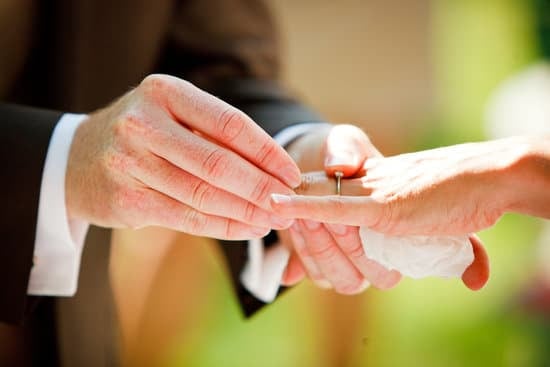The answer is yes, you can. In this article, we will explore the importance of cleaning your wedding dress, the different types of fabrics used in wedding dresses and their cleaning requirements, as well as the pros and cons of cleaning your wedding dress at home.
Cleaning your wedding dress is crucial to preserve its beauty and keep it looking its best for years to come. Whether you plan on storing it as a keepsake or passing it down to future generations, proper cleaning and care are essential.
Different types of fabrics used in wedding dresses require specific cleaning methods to ensure that they are not damaged in the process. This article will provide you with valuable information on how to clean various fabrics such as silk, lace, tulle, satin, and more.
In addition to discussing the importance of cleaning your wedding dress and understanding the different fabric types, we will also explore the advantages and disadvantages of choosing to clean your wedding dress at home. While DIY cleaning can be cost-effective and convenient, there are certain risks involved that should be considered.
Stay tuned as we delve into the step-by-step guide to cleaning your wedding dress at home, including the supplies needed for this task and tips for removing different types of stains.
Different Types of Fabrics Used in Wedding Dresses and Their Cleaning Requirements
When it comes to cleaning your wedding dress at home, it’s essential to understand the different types of fabrics used in wedding dresses and their specific cleaning requirements. Wedding dresses can be made from a variety of fabrics, including silk, satin, tulle, lace, and chiffon, each with its own unique characteristics and needs when it comes to cleaning.
Silk
Silk wedding dresses are luxurious and delicate. Cleaning silk fabric requires extra care as it is more prone to damage from water or harsh cleaning chemicals. Spot-treating stains with a gentle detergent or taking the dress to a professional cleaner is often recommended for silk wedding dresses.
Lace
Lace is a delicate fabric commonly used in wedding dresses. When it comes to cleaning lace, it’s important to avoid rubbing or scrubbing as this can cause damage to the intricate details. Lace wedding dresses should be delicately hand-washed or dry cleaned by a professional.
Satin
Satin is another popular fabric used in wedding dresses. It’s important to use a gentle detergent and cold water when cleaning satin as heat can damage the fabric. Satin wedding dresses may also benefit from being steamed after cleaning to remove any wrinkles.
Understanding the specific cleaning requirements for the fabric of your wedding dress is crucial when considering whether you can clean your wedding dress at home. Different fabrics may require different methods of cleaning and care to ensure that your dress remains in pristine condition for years to come.
Pros and Cons of Cleaning Your Wedding Dress at Home
When it comes to cleaning your wedding dress, you may be wondering if you can clean it at home or if it’s better to seek professional help. Both options have their pros and cons, so it’s important to weigh them carefully before making a decision.
One of the main advantages of cleaning your wedding dress at home is cost-effectiveness. Professional wedding dress cleaning can be expensive, so doing it yourself can save you some money. Additionally, cleaning your dress at home allows you to have complete control over the process and the products used. This means that you can choose gentle, eco-friendly detergents that are less likely to damage delicate fabrics.
On the other hand, there are some potential drawbacks to cleaning your wedding dress at home. Some fabrics, such as silk or lace, require special care that may be best left to professionals. Inexperienced handling might lead to irreversible damage on the fabric that could ruin the appearance of the dress. Additionally, stubborn stains like wine or mud might be difficult to remove without professional equipment and expertise.
Overall, determining whether to clean your wedding dress at home or seek professional help depends on factors like the fabric type and level of staining on the dress. Considering these elements can help guide you in making an informed decision about how to best clean your cherished garment.
| Advantages | Disadvantages |
|---|---|
| Cost-effective | Potential for irreversible damage |
| Complete control over process and products used | Difficulty in removing stubborn stains without professional equipment |
Step-by-Step Guide to Cleaning Your Wedding Dress at Home
Cleaning your wedding dress is a crucial part of wedding preparations. Not only does it ensure that your dress looks pristine on your special day, but it also helps to preserve the fabric and prevent any long-term damage. Additionally, storing a dirty wedding dress can result in permanent stains that may be difficult to remove in the future.
When considering cleaning your wedding dress at home, it is important to first identify the type of fabric used in your dress. Different fabrics such as silk, satin, lace, or tulle have varying cleaning requirements. For example, while some dresses made of robust fabrics like polyester or nylon can be hand-washed or machine washed on gentle cycle, delicate fabrics like silk or lace may require more specialized care.
While there are advantages to cleaning your wedding dress at home such as cost-effectiveness and convenience, there are also some potential risks involved. It’s important to consider whether you have the necessary skills and knowledge to properly clean your specific type of wedding dress without causing damage. If unsure, it may be best to seek professional help.
| Wedding Dress Fabric | Cleaning Requirements |
|---|---|
| Silk | Dry Clean Only or Hand Wash with Special Silk Detergent |
| Lace | Dry Clean Only or Spot Clean with Gentle Stain Remover |
| Chiffon | Gentle Machine Wash in Cold Water or Dry Clean |
Supplies Needed for at-Home Wedding Dress Cleaning
When it comes to cleaning your wedding dress at home, there are a few essential supplies you will need to ensure that the process is a success. Here are the key items you will need:
Supplies Needed:
- Gentle detergent or specially formulated wedding dress cleaner
- Soft bristle brush or sponge
- Clean, white towels
- Distilled water
- Large bathtub or clean, spacious area for laying out the dress
- White cotton gloves to handle the dress with care
- Plastic garment bag for storing the dress after cleaning
It is important to note that using the wrong type of detergent or cleaner can potentially damage the delicate fabrics and intricate details of your wedding dress. Therefore, be sure to choose a gentle detergent specifically designed for delicate fabrics, or even better, invest in a specially formulated wedding dress cleaner that is recommended by professionals.
In addition to these supplies, having access to distilled water is crucial for avoiding any mineral deposits remaining on your dress during the cleaning process. This type of water is free from impurities that can i clean my wedding dress at home might have and will help prevent any unwanted residues on your gown.
Tips for Removing Different Types of Stains From Your Wedding Dress
When it comes to removing different types of stains from your wedding dress, it’s important to proceed with caution to avoid damaging the fabric. Here are some tips for dealing with common stains that you may encounter:
1. Dirt and mud: Gently brush off any dried dirt or mud with a soft-bristled brush. For any remaining traces, spot-treat the area with a mild detergent and water solution using a clean cloth. Avoid rubbing the fabric aggressively, as this can cause discoloration.
2. Food and beverage stains: Blot the stain gently with a clean, dry cloth to absorb as much of the liquid as possible. Avoid rubbing, as this can push the stain further into the fabric. For light-colored fabrics, consider using a small amount of white vinegar diluted in water to dab at the stain.
3. Sweat stains: Mix a solution of white vinegar and water in equal parts and lightly dab at the sweat stains on your dress. Allow the solution to sit for a few minutes before blotting it dry with a clean cloth.
4. Makeup stains: Use an alcohol-based makeup remover on a cotton swab to carefully dab at makeup stains on your dress. Be gentle to avoid spreading the stain further.
Remember that these methods may not work for all types of fabrics, so it’s crucial to test them on a hidden area of your dress first to ensure they won’t cause damage. If you’re unsure about how to proceed, consider seeking professional help to remove stubborn stains without risking harm to your wedding dress.
How to Properly Store Your Wedding Dress After Cleaning
Properly storing your wedding dress after cleaning is crucial to maintain its pristine condition for years to come. Whether you are planning to pass it down as an heirloom, or just want to preserve it as a tangible memory of your special day, following the correct procedures for storage is key.
Use Acid-Free Materials
When it comes to storing your wedding dress, using acid-free materials is essential. Acid-free tissue paper can be used to stuff the bodice and sleeves of the gown to help it keep its shape. This will also help prevent any creases or wrinkles from setting in during storage. Acid-free boxes are ideal for long-term storage, as they provide protection against yellowing and discoloration.
Choose a Suitable Location
The location where you store your wedding dress plays a significant role in its preservation. Avoid placing it in areas with extreme temperature changes, such as attics or basements. Instead, opt for a cool, dry, and dark place like the back of a closet or under the bed. Make sure the chosen location is free from any potential pests that can cause damage to the fabric.
Regularly Inspect and Refold
It’s important to periodically inspect your wedding dress while in storage to ensure that there are no signs of yellowing, dampness, or pests. Every six months or so, refold the dress along different lines than before to minimize permanent creases and stress on certain areas of the fabric.
Following these tips can help ensure that your wedding dress remains in pristine condition for many years to come.
When to Consider Professional Wedding Dress Cleaning Instead of DIY Option
Cleaning your wedding dress is an important step in preserving the memory of your special day. Whether you choose to clean your dress at home or seek professional help, it’s crucial to ensure that your cherished garment remains in excellent condition for years to come.
Different types of fabrics used in wedding dresses require specific cleaning methods and it can be a daunting task to tackle at home. While cleaning your wedding dress at home
On the other hand, inexperienced handling of stains or delicate fabrics
When deciding whether to clean your wedding dress at home or seek professional help, it’s important to consider the fabric type, any intricate detailing on the gown, and the severity of any stains. If you’re unsure about how to properly clean your wedding dress at home and want the best results possible, it may be best to leave it in the hands of professionals.
A professional cleaning service
Frequently Asked Questions
Can I Wash My Own Wedding Dress?
Yes, it is possible to wash your own wedding dress, but it’s crucial to follow the care instructions on the label. Some wedding dresses may require professional cleaning due to delicate fabrics or intricate embellishments, so make sure to read the label carefully before attempting to wash it yourself.
Is It Safe to Wash Wedding Dress in Washing Machine?
Washing a wedding dress in a washing machine can be risky, especially for dresses made of delicate fabrics like silk or lace. The agitation and spin cycle of a washing machine can damage the fabric and any beadwork or decorations on the dress.
It’s generally safer to have your wedding dress professionally cleaned to ensure it stays in good condition.
What Happens if You Don’t Dry Clean Your Wedding Dress?
If you don’t dry clean your wedding dress and store it without proper cleaning, stains or yellowing may set in over time. Additionally, any unseen spills or residue from the wedding day (such as champagne or food) can attract insects and cause permanent damage if left untreated.
Dry cleaning helps prevent these issues and ensures that your wedding dress remains pristine for years to come.

I have been involved in marriages for over 20 years helping couples and singles understand more about them.





